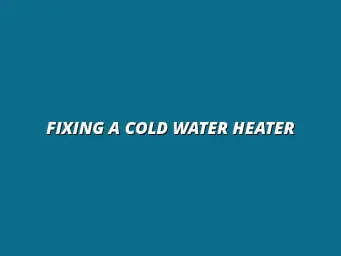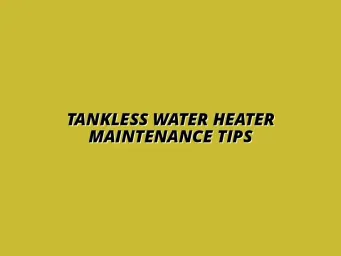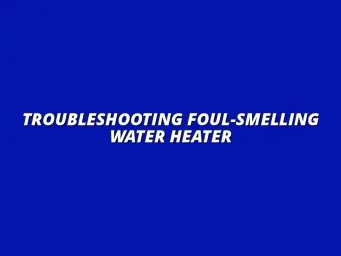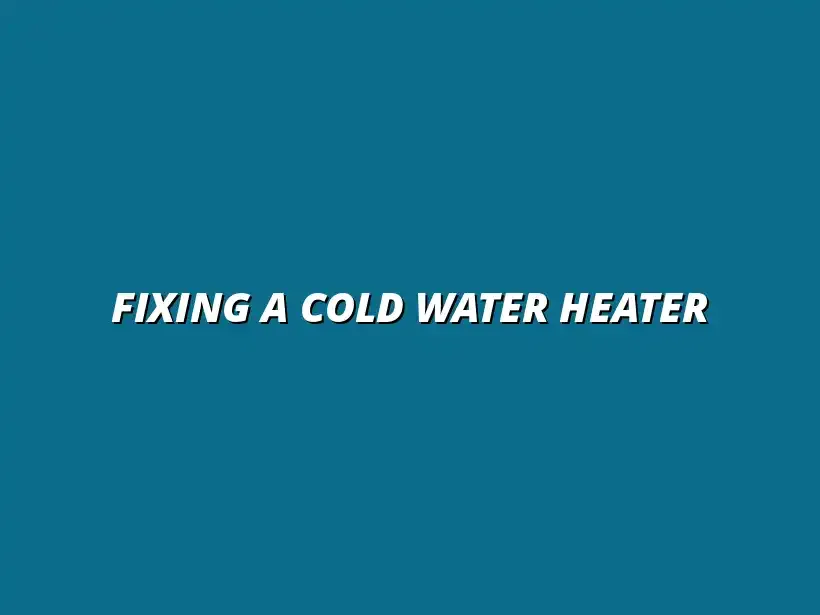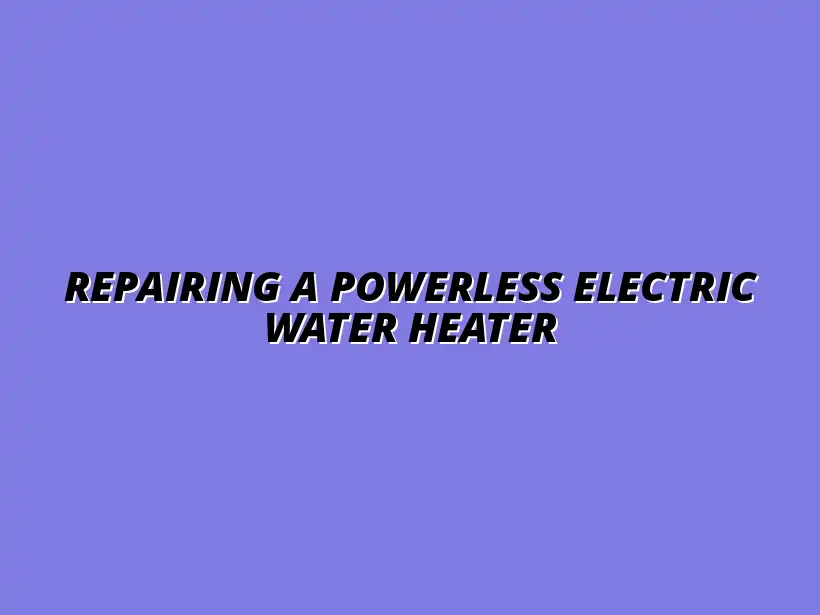
Repairing a Powerless Electric Water Heater
Understanding Electric Water Heaters and Their Power Sources
Electric water heaters are popular choices for many households, mainly due to their efficiency and ease of use. They work by using electric elements to heat water, providing a steady supply for daily needs like bathing, cooking, and cleaning. Understanding how these systems operate and their power sources is essential for troubleshooting any issues that may arise.
When an electric water heater is activated, electricity flows to the heating elements, which then convert this energy into heat. The water in the tank is warmed up until it reaches the desired temperature, which is often set by the thermostat. Once the water reaches the set temperature, the thermostat automatically turns off the heating elements to prevent overheating, ensuring both safety and efficiency.
Overview of Electric Water Heater Functionality
In essence, electric water heaters rely on simple mechanics combined with electrical force. When you turn on the hot water faucet, the cold water in the tank is pushed out, making room for more cold water to enter. This cycle continues as long as there is a demand for hot water, making them efficient for homes with regular hot water usage.
- Electric heating elements heat the water directly.
- Thermostats regulate the water temperature.
- Insulation keeps the water warm, conserving energy.
How Electric Water Heaters Operate
Electric water heaters operate through a combination of heating elements and thermostats that work in harmony. When the water temperature drops below a certain level, the thermostat activates the heating elements. This process ensures that hot water is always available when needed.
Most electric water heaters come with two heating elements — one at the top and another at the bottom of the tank. This design allows for a faster heating process and provides a more consistent supply of hot water. If one element fails, it can significantly reduce the heater's performance. If your water heater won't start, you might find helpful guidance in this guide on fixing a water heater that won't start.
The Role of Power in Heating Water
The efficiency of an electric water heater largely depends on its power source. Most units operate on a standard 240-volt electrical supply. It’s important to ensure that your home is equipped to handle this voltage to avoid complications. Any issues with the power supply can lead to inconsistent heating or complete failure of the unit.
Knowing how much power your electric water heater consumes can help you manage electricity bills effectively. On average, they use between 3,000 to 5,500 watts per hour, depending on the size and model. Monitoring your electrical usage can also alert you to potential problems before they escalate!
Identifying Common Signs of Power Issues
Recognizing symptoms of power issues in electric water heaters is crucial for timely maintenance and repair. Many problems can manifest in various ways, and knowing what to look for can save you time and money. If your water heater is not functioning as expected, it’s essential to troubleshoot the problem immediately. For example, leaks can be a serious issue, so if you're experiencing emergency plumbing for water heater leaks, it’s crucial to address it promptly.
Power issues can lead to a lack of hot water, strange noises, or even error codes displayed on the control panel. These signs often indicate that there is something amiss with the electrical supply or the water heater itself. Being proactive in identifying these issues can help prevent more significant problems later on.
Recognizing Symptoms of Electric Water Heater Malfunction
Symptoms of electric water heater malfunction can vary, but some common signs include:
- No hot water, even after running the unit for a while.
- Water is not heating up to the set temperature.
- Unusual noises, such as popping or rumbling.
- Visible leaks or moisture around the heater.
Indicators of No Power to the Water Heater
If you suspect that your electric water heater has lost power, there are specific indicators to look for. First, if the heater does not respond when you turn on the hot water faucet, it’s a clear sign something is wrong. Additionally, checking for any error codes on the display can help pinpoint the issue.
Another indicator is the absence of activity from the heating elements. If you can access the unit's wiring, look for any signs of burnt connections or loose wires. These could be the underlying causes of the power failure!
Common Error Codes and What They Mean
Modern electric water heaters often come equipped with digital displays that show error codes, making it easier to diagnose issues. Here are a few common error codes and their meanings:
- E1: Thermostat failure.
- E2: Overheating protection activated.
- E3: Water flow problem.
Understanding these codes can guide you in troubleshooting your water heater more effectively. If you come across an unfamiliar code, consult the user manual or seek professional assistance to prevent further damage. For efficient maintenance tips, consider this helpful guide on how to maintain your water heater efficiently.
Maintaining Your Electric Water Heater for Optimal Performance
To keep your electric water heater running smoothly and efficiently, regular maintenance is key! Regular checks and simple upkeep can prevent major issues down the line. It’s essential to develop a maintenance routine that includes both inspections and necessary repairs.
One of the best ways to ensure your water heater operates at its best is through routine inspections. This can help catch small issues before they become big problems that might require costly repairs. By being proactive, you can significantly extend the lifespan of your appliance!
Regular Maintenance Tips to Prevent Future Issues
Implementing a few straightforward maintenance tips can save you from unexpected breakdowns. Here’s a list of actions you can take:
- Check the temperature setting: Keep it between 120-140°F for efficiency.
- Flush the tank regularly: Remove sediment build-up that can affect heating.
- Inspect the anode rod: Replace it every few years to prevent rust.
- Look for leaks: Regularly check for any signs of leaking around fittings.
By following these tips, you can significantly reduce the chances of your electric water heater running into issues. Remember, it’s always better to catch potential problems early! If you’re facing issues with your pilot light, you can find solutions in this guide on fixing a water heater pilot light.
Importance of Routine Inspections and Maintenance
Routine inspections are essential for identifying underlying issues before they escalate. Regularly inspecting your electric water heater helps ensure it functions safely and efficiently. Neglecting maintenance can lead to decreased performance and even complete failure.
Setting a reminder for annual checks might be a helpful practice. This way, you can stay ahead of any potential problems and keep your water heater in top shape!
How Water Quality Affects Heater Performance
The quality of water in your home can significantly influence the performance of your electric water heater. Hard water, for example, can lead to mineral build-up inside the tank and reduce heating efficiency. This build-up may even require more frequent maintenance!
To combat these issues, consider using a water softener if you live in an area with hard water. This can help protect your heater and improve its overall efficiency.
Frequently Asked Questions About Electric Water Heaters
When it comes to electric water heaters, I often get a lot of questions about how they work and how to troubleshoot common issues. Understanding these can make a huge difference in maintaining your unit and knowing when to act.
Let’s dive into some of the most frequently asked questions and their answers to help demystify electric water heaters!
What Causes an Electric Water Heater to Lose Power?
Several factors can lead to an electric water heater losing power. Here are some common culprits to consider:
- Tripped circuit breakers: Check if the breaker needs resetting.
- Blown fuses: This can interrupt the power supply to your heater.
- Faulty heating elements: If they’re burnt out, the unit won’t heat water.
- Thermostat issues: A malfunctioning thermostat can lead to power loss.
If you encounter any of these problems, addressing them quickly can prevent further damage. Always ensure safety first when troubleshooting these issues!
Common Electrical Issues and Their Solutions
While power loss can be frustrating, there are often straightforward solutions. Here's a list to help you get started:
- Reset the circuit breaker if tripped.
- Replace blown fuses with new ones that match the amperage.
- Inspect wiring for loose or corroded connections.
- Consider professional help for complicated electrical repairs.
By knowing these simple fixes, you can tackle many common electrical issues yourself! For unclogging drains, which can sometimes be related to plumbing issues affecting water heater performance, you might find this guide helpful: How to unclog your bathroom drain easily.
How Can I Tell If My Electric Water Heater Is Broken?
Identifying a broken electric water heater can be tricky, but there are some clear signs to watch out for. Here are a few indicators:
- No hot water coming from faucets.
- Unusual noises like popping or rumbling sounds.
- Water discoloration or unpleasant odors.
- Leaking around the water heater.
If you notice any of these symptoms, it's essential to investigate further. Don't wait too long, as this could lead to bigger problems down the line!
Signs of Malfunction Beyond Power Issues
Aside from power loss, several other signs can indicate a malfunctioning heater. Recognizing these signs can be crucial in determining the need for repair. For instance, if the water temperature fluctuates irregularly, this could signify a failing thermostat.
Also, if you're experiencing rust-colored water, it's essential to check the anode rod or consider replacing the unit altogether. Staying vigilant about these symptoms can save you a lot of trouble! If you need a plumber in Birmingham, UK, you might consider checking out this plumber in Deritend, Birmingham.
Final Recommendations and Resources for Electric Water Heater Repair
In the event you can't fix the problem yourself, knowing when to call a professional is vital! A good plumber or electrician can often save you time and trouble, ensuring your heater gets back to optimal performance swiftly. Here’s how to find the right help!
By taking the time to research and connect with qualified professionals, you can make informed decisions about your electric water heater repairs.
Connecting with Professional Help When Necessary
Finding a qualified plumber or electrician is crucial for more complex repairs. Here are some tips for ensuring you choose the right one:
- Check reviews and ratings from previous customers.
- Ask for recommendations from friends or family.
- Ensure they’re licensed and insured.
- Get multiple quotes to compare prices.
Taking these steps can help you feel confident in your choice and ensure you’re getting the best possible service! Replacing your kitchen garbage disposal might also require professional help, and you can find more information here on replacing your kitchen garbage disposal.
Finding a Qualified Plumber or Electrician
Once you know you need help, focus on finding the right professional. Utilize online platforms to read reviews and find local experts. You can also check with your state licensing board to verify the contractor's credentials.
By doing your homework, you’ll be better equipped to hire someone who can solve your electric water heater issues effectively!
Assessing Cost-Effectiveness of Professional Repairs
Before committing to any repairs, it’s wise to assess whether hiring a professional is cost-effective. Compare the price of repairs to the cost of replacing your unit entirely. Sometimes, if repairs are expensive or frequent, replacing might be a better long-term solution.
Always weigh the pros and cons, ensuring you choose the best option for your pocket and your needs!
Additional Resources for Homeowners
To further assist you in maintaining and troubleshooting your water heater, I’ve gathered some useful resources. These can provide valuable insights and guidance:
- Links to helpful guides on electric water heater maintenance.
- Troubleshooting videos demonstrating common repairs.
- Community forums where you can ask questions and share experiences.
Utilizing these resources can empower you with the knowledge you need to keep your electric water heater in great shape!
Links to Helpful Guides and Troubleshooting Videos
Finding quality information online can make all the difference! Websites like Home Depot or DIY Network offer comprehensive guides on electric water heater maintenance and repairs. YouTube also has numerous instructional videos that can visually guide you through various processes.
These resources can serve as valuable tools in your maintenance toolkit, making it easier to handle any issue that arises!
Community Forums for Electric Water Heater Support
Joining community forums can be a great way to connect with others who have faced similar challenges. Online platforms like Reddit or specialized plumbing forums allow you to ask questions, share experiences, and gain insight from fellow homeowners. You might find solutions you hadn't considered!
Being part of a community can provide not only answers but also support as you navigate issues with your electric water heater.
